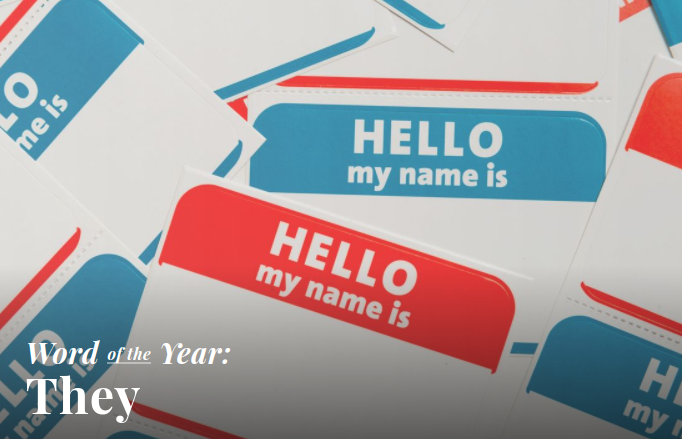
Merriam-Webster selected the non-binary pronoun “they” as the 2019 Word of the Year.
The dictionary giant reports that in 2019 searches of “they” on its site increased by 313 percent from the previous year.
Earlier this year in September, Merriam-Webster officially expanded the definition of the pronoun to include references to “a single person whose gender identity is non-binary.” The dictionary says “there is no doubt” that this use is “established in the English language.”
“English famously lacks a gender-neutral singular pronoun to correspond neatly with singular pronouns like everyone or someone, and as a consequence ‘they’ has been used for this purpose for over 600 years,” the Merriam-Webster website reads. “More recently, though, they has also been used to refer to one person whose gender identity is non-binary, a sense that is increasingly common in published, edited text, as well as social media and in daily personal interactions between English speakers.”
The dictionary defines non-binary as “relating to or being a person who identifies with or expresses a gender identity that is neither entirely make no entirely female.”
[pullquote-1]
Molly Quinn, executive director of OUTMemphis, said many who have opposed the use of “they” as a singular pronoun in the past have used “the guise of grammar to delegitimatize queer people and experiences.”

Quinn
“By putting ‘they’ smack into our dictionary, Merriam-Webster gives power and visibility to non-binary and gender-curious people. The singular they has been used for centuries, and is only criticized by those seeking to denigrate.”
Quinn adds that the singular “they” is not only essential for those who elect to use it as their primary pronoun, but the pronoun can also be used to describe those whose gender identity is unknown.
“Which is another way of saying the singular they gives us all autonomy and freedom,” she said. “Language has always been used as a tool of both marginalization and of reclamation for small and significant acts of oppression. By reclaiming our language, we reclaim our right to tell our own stories.”
Chris Sanders, executive director of the Tennessee Equality Project, said the following about Merriam-Webster’s election of “they” as the word of the year:
“When singer Sam Smith came out as non-binary, millions of people became more aware of people who use the singular ‘they’ pronoun,” Sanders said. “Rather than openness and understanding, non-binary people are still often met with arguments about grammar. So, it matters a great deal that a dictionary now no longer provides the underpinnings of disrespect.”